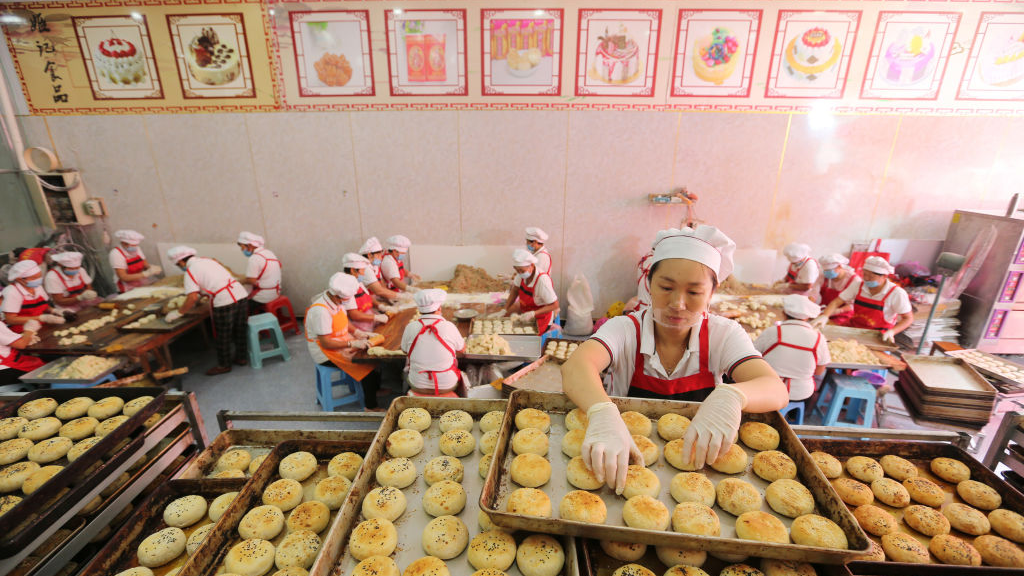Editor's note: Dr. Wang Yan is an associate research fellow at China's National Institute of Education Sciences. The article reflects the author's opinions, and not necessarily the views of CGTN.
This year's Mid-Autumn Festival is unusual as it coincides with the National Day, which commemorates of the founding of the People's Republic of China. It is also the first grand festival as people return to normal life after the COVID-19 pandemic.
The festival usually features the fullest and the most beautiful moon of the year. To Chinese people, a full moon implies prosperity and reunion for the whole family, eating mooncakes, which are round in shape, best complements the harvest moon in the night sky during the festival.
As people become better-off and enjoy all kinds of cakes in daily life, mooncakes are no longer the only delicacies. Yet it is still an indispensable dessert for dinner during the festival, not for its taste, but more for the profound spiritual feeling of completeness and togetherness associated with the culture of reunion.
People also present mooncakes or other gifts to relatives or friends to express their appreciation, affection and best wishes as one of the ceremonies that they observe in China. Likewise, eating mooncakes is part of celebration that reminds them of the significance of getting together and the bond of love among family members.
However, as the pandemic negatively impacted the global economy, many annual mooncake fairs canceled or downsized to comply with social-distancing rules, meaning many people far away from home had fewer mooncakes to choose from.
Some people, especially those abroad, could not go home for family reunions due to travel restrictions.
For these people, the ancient verse "Thoughts on a Tranquil Night" written during the Tang dynasty by poet Li Bai is relived:
"Before my bed a pool of light—
O can it be hoar-frost on the ground?
Looking up, I find the moon bright;
Bowing, in homesickness I'm drowned."
(translated by the well-known translator Xu Yuanchong)
However, none of these restrictions could change people's love towards their home, family and hometown. Rather, the bond is getting stronger than ever, as people learn to cherish life and their loved ones in the aftermath of the pandemic.
As another verse in "Prelude to Water Melody" written during the Song dynasty by poet Su Shi goes:
"So let us wish that man
Will live long as he can!
Though miles apart,
We'll share the beauty she displays."
(Also translated by Xu Yuanchong)

Workers make mooncakes for the upcoming traditional Mid-Autumn Festival at a food workshop in Suixi county in central China's Anhui Province, September 21, 2020. /Getty Images
Workers make mooncakes for the upcoming traditional Mid-Autumn Festival at a food workshop in Suixi county in central China's Anhui Province, September 21, 2020. /Getty Images
Thanks to advancements in technology, people can still see each other and interact with each other instantly through social media, such as WeChat and WhatsApp. People can also create and edit animated messages or video clips to express their best wishes to those away from home.
All these ceremonies are because family is a harbor of mind where people can always resort to for peace and joy of life. Family is the first place where children get educated and also the vehicle that passes on values and virtues of life. All the hardships inflicted upon people can be resolved through love and care at home that enable them to get refreshed and energized to overcome various challenges from the outside world.
In Chinese, nation (guo jia) consists of two characters, the state and the family. Essentially, in Chinese culture, nation is the biggest family. It is supposed that the nation protects its people from dangers and risks and empowers its people for well-being and prosperity. Hence Chinese people have a strong sense of belonging or attachment to family and also profound cultural identification with their country. It is believed where there is peaceful state, there is family reunion.
That's what the Chinese people have experienced with COVID-19. Thanks to the leadership and efforts of the central government, China has successfully contained COVID-19, thus ensuring people have a safe home for celebration during the festival.
The success has not come easy at all. A total of 162.4 billion yuan has been invested by the government for pandemic prevention and control by the end of May. In addition, the government will invest 2,000 billion for recovery of businesses and industries.
Hence this year people's sentiments for the celebration on October 1 are mixed, with joy for harvest and family reunion, appreciation and affection towards the motherland, relief from the catastrophic pandemic and memory of those who have passed away during COVID-19 and longing for wellbeing for the future.
Today, billions of Chinese people also celebrate the commencement of an eight-day-long national holiday, by travelling across China, visiting their families and friends, dining out and shopping around in bustling cities and towns across the country. Indeed, the nation has become stronger after the crisis.
Perhaps there would be no better reasons for people to celebrate the two festivals on the same day, – as it is the nation that created a safe and prosperous land for the people to celebrate family gatherings, with love and power refreshed from the festival, and together advancing towards a better-off society of China.
(If you want to contribute and have specific expertise, please contact us at opinions@cgtn.com.)